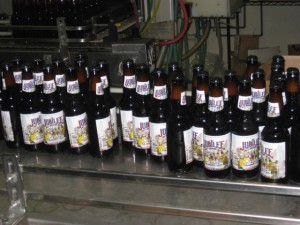Let’s assume you’ve done all your research and you know how tough it is to make it in the beer business. You know it’s not the smartest place to park your family/friend’s money, but you’ve been bitten by the craft beer bug and there’s just no stopping you.
 So what’s the best way to do it?
So what’s the best way to do it?
After talking with 22 different breweries and getting 22 different opinions, I’m thoroughly convinced that there isn’t ONE perfect way. Dogfishhead started on a 10 gallon system and Sam Adams started by contract brewing. Both are doing pretty well.
If I were going to go “all in”, my ideal scenario would be contract brewing the bottles and having a relatively small brewpub/tasting room that served draft only. That way you are getting the exposure of a packaging facility with essentially the investment of a brewpub. More on that in another post.
The path that “felt” right for me was contract brewing. First off, I didn’t have $2-3 million in the bank to build my own brewery with a bottling line, and I didn’t think I could convince many people that the best way to try and recoup that type of investment was $3-4 at a time (a safe ballpark for profit margin per case of beer for a startup).
Contract brewing allows you to get your beer on the shelves without the risk of owning your own brewery. While some brewery owners thumb their nose because contract brewing isn’t as “authentic”, many of the most successful beer brands have started out this way.
From a dollars and sense standpoint, it’s the best way to get into the business. You are only buying the beer itself, the labels, 6 pack holders and cases. That means you can turn a small profit in year one, whereas most breweries won’t turn a profit until year 3-5 (depending on volume). So you’re making a little money while growing your brand, which will make you much more attractive to investors than just showing up with your homebrew kit and a boundless amount of enthusiasm.
Contract brewing isn’t all sunshine and roses, however.
For starters, you’re not actually brewing the beer, which for many aspiring brewery owners is a deal-breaker.
Finding a brewery that brews good beer, has capacity AND is willing to contract brew is easier said than done. They are out there, but there’s not a list of breweries who are looking to contract brew posted online. Fortunately I had a mutual family friend with the owners of BBC and even more  fortunately, they’re great guys who believe in what I’m trying to do.
fortunately, they’re great guys who believe in what I’m trying to do.
Next let’s talk money. If you cringed when you learned how bad the margins are in craft beer, the contract brewing margins will be like a swift kick to the man bag. So you may not want to go into contract brewing thinking you can make a living right off the bat (I also have a full-time job).
All that being said, I couldn’t be happier with my decision to go the route of contract brewing. It’s allowed me to get into the business for a relatively minimal investment (it’s still a lot for me), learn from my initial mistakes on my own dime rather than on investors’ dime, and have a heck of a good time while doing it.
This is the second in a series of posts about my experience in the beer business. Next up I’ll talk about what it was like getting Jubilee off the ground. If you like this post, help spread the word by posting it to your Facebook page. If you have questions about the beer business, feel free to email me at mark@jubileebeer.com.

{ 0 comments… add one now }